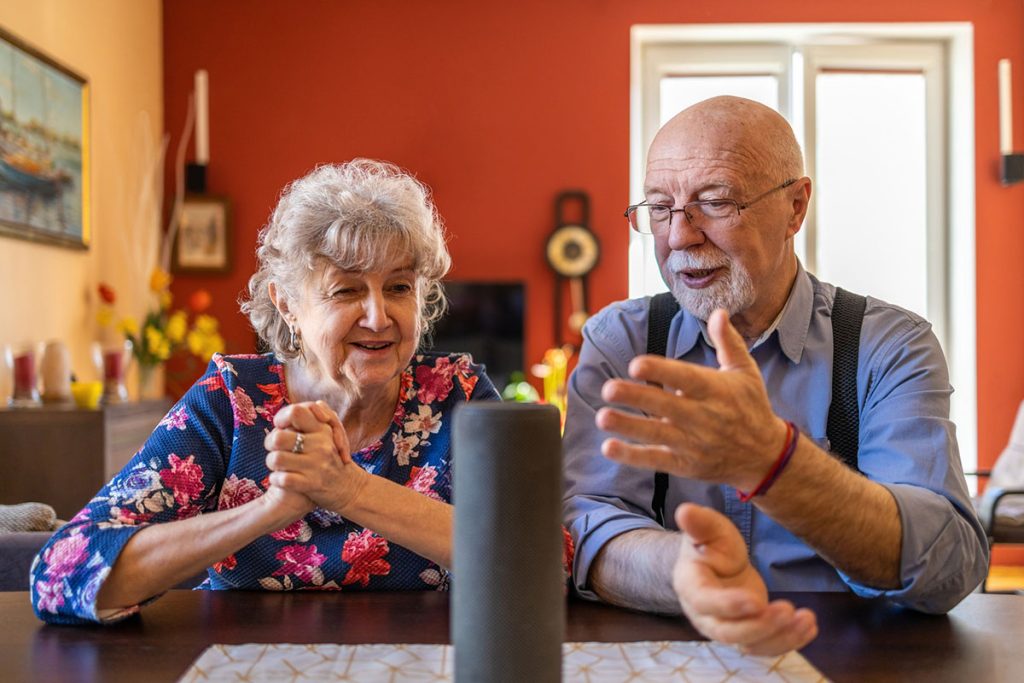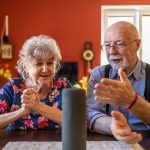Table of Contents
First released in 2013 as a voice-activated assistant for Amazon smart devices, Alexa has been going strong as one of the leading technologies of its kind. Since its beginning, Alexa voice assistant has transformed to learn new skills and complete various tasks to help everyone, including seniors, make video calls, control a smart thermostat, shop online, and more.
17 Ways Alexa Can Help the Elderly
- Regular and Emergency Calls
- Medication Reminders
- Doctor Appointment Scheduling
- Family Member Drop-Ins
- Medical Alerts
- Care Hub and Alexa Together
- Audiobooks
- Listening to News
- Answering Medical Questions
- Smart Home Features
- Setting Alarms
- Making Lists
- Burglar Deterrent
- Extra Speaker
- Captioning
- Show and Tell
- Online or Grocery Shopping
There are potentially endless benefits of Alexa for seniors. The smart home assistant does so much more than control an Amazon Echo device or play music. The incredible voice technology can also assist an older person with life alert tasks, list-making, captioning, and video calling with loved ones.
And, unlike other tech devices, Amazon Alexa can be relatively straightforward for an older person to learn. Using an Amazon Echo Dot or another smart device, seniors can use Amazon Alexa skills just by speaking, allowing them to operate the device hands-free.
What Is Alexa?
Alexa is a voice assistant product from Amazon. Amazon developed the technology to use with its several smart devices, like Amazon Echo Dot and Amazon Echo Show. Each Alexa-enabled device completes various tasks through Alexa Skills, which are learned behaviors and tasks you can add to an Alexa device.
This somewhat new form of artificial intelligence allows anyone to complete everyday tasks, enjoy entertainment, check on their retirement benefits or bank account, and stay connected to loved ones.
And, there are many benefits of using Alexa for seniors, like aging parents or grandparents. Hands-free Alexa devices complete tasks via the internet without confusing buttons and technology. Alexa learns a person’s voice and responds when they give a voice command, like “Alexa, set an alarm for 5:00 am.”
To use Alexa for seniors, Amazon’s Alexa just needs to be connected to the internet and an Amazon account to use Alexa for seniors.
What Is the Difference Between Alexa and Echo?

If you’re considering using Alexa for seniors in your life, it’s a good idea to become familiar with Alexa and different smart home devices that work with Alexa. Something that tends to confuse people is the difference between Alexa and Echo.
Quite simply, Alexa is the voice assistant program that operates on an Amazon smart home device. Echo is the actual device that runs Alexa. There are a few different Echo devices, like the Echo Studio, Echo Dot, and Echo Show. Each Echo device and generation has various features and skills built into it, but they all operate Alexa as their voice assistant.
17 Ways Alexa Can Help the Elderly
While retailers and organizations offer programs to help the elderly, with discounts for seniors and benefits for elderly veterans, there hasn’t been much of a path carved out for them to learn and use technology to keep up with the modern world.
That is until Alexa came along. Amazon’s Alexa app and devices have revolutionized senior care, delivering a simple way for seniors to stay connected with the world around them. The following are just some of the many ways to use Alexa for seniors.
1. Regular and Emergency Calls
Making phone calls has never been easier than it is with the Alexa voice assistant. Whether a senior wants to call a caregiver or aide to help them with a task or they need to make an emergency call after a fall, Alexa allows them to do it with voice control. The feature is much simpler for an older person who may have trouble seeing or pushing phone buttons or operating a phone. Plus, it can be a literal life-saver for seniors who may not be able to get to the phone in case of an emergency.
Depending on the device, Alexa can connect a senior with a phone or video call. Amazon Echo Show has a smart display with video capability for face-to-face phone calls. To use Alexa’s calling feature, a person can say, “Alexa, call [person’s name]” or “Alexa, call 9-1-1” in an emergency.
2. Medication Reminders
Does your loved one have trouble staying on top of the medications they take throughout the day? With an Alexa-enabled device, seniors can set a medication reminder at any point during the day or night that they need to remember to take their medication.
Depending on the pharmacy your loved one uses, there may already be a skill available that scans their prescriptions and sets reminders automatically. For instance, Giant Eagle Pharmacy has a skill that does this. Some pharmacy skills also allow you to use Alexa to refill medications without making a phone call.
If their pharmacy doesn’t yet have a skill, you can still ask Alexa to manage your medications to set reminders manually.
Once a reminder pops up for a senior, they can ask Alexa what medication they’re supposed to take at that time, if necessary.
3. Doctor Appointment Scheduling
Doctors’ appointments can also be challenging to manage for an older person. Keep your loved ones on track with their appointments by using the built-in calendar feature to add upcoming appointment dates to the list. Alexa will remind them when an appointment is nearby, even days in advance if you set it up that way.
Some healthcare systems also allow appointment scheduling through their Alexa skills. If your loved one needs to set up an appointment with their primary care physician or a specialist, they can open the healthcare system’s skill and use voice control to set an appointment.
4. Family Member Drop-Ins
With the Alexa app installed on a device, like an iPad or Echo Show, family members can “drop in” to check on a loved one. This feature gives peace of mind to the family of seniors who might live alone or don’t have someone nearby to check on them regularly.
Alexa’s Drop-In feature lets you start a video with your elderly loved one with the quick tap of a button or by using a voice command on the Alexa app. Once connected, you can see your loved one via the camera on their device. This also makes for a simple way to start a video conversation.
Non-video devices can also use the drop-in feature, but you’ll connect with your loved one via a voice call rather than a video call.
5. Medical Alerts
Amazon Alexa is more than just convenient for seniors; it also promotes safety. Alexa for seniors can double as a medical alert system, potentially even replacing other pricey alert systems and subscriptions they might currently use.
One of the most popular ways to do this is with the Ask My Buddy app, which lets seniors add specific contacts to their devices to contact in case of an emergency. Once they add a contact, they can then use Ask My Buddy to have that person check in on them or call them if they need a helping hand. The app can help seniors who don’t have access to or can’t reach their medical alert button.
The My SOS Family skill also sends calls or texts to preloaded contacts in an emergency. It also sends a GPS location to your emergency contact to let them know where to find you.
6. Care Hub and Alexa Together

Alexa Care Hub is a free service that connects family members and loved ones, allowing them to check in on one another. It’s one of the easiest and fastest ways to contact an elderly family member for a quick check-in to make sure they’re doing okay. Healthcare professionals can also use the Care Hub to connect with seniors for video appointments or check-ins.
Through the Care Hub, seniors can set emergency contacts and manage alerts to let others know if they’re okay or need help.
More recently, Amazon added Alexa Together to the Care Hub. This feature makes it easier for a family member to set up and manage another person’s connected Care Hub device. Therefore, seniors who may not be as technologically savvy can still have all necessary features available to them, but another loved one can do the legwork of setting it up as needed.
7. Audiobooks
As they age, older people might have vision or cognitive difficulties that hinder their reading ability. However, with the Alexa app or a connected device, seniors can listen to audiobooks instead.
Both Kindle and Audible connect to Alexa, but other services also work with the voice assistant. Connect your loved one’s account to access their books (or, if they use Kindle, their connected Amazon account will already include their downloaded books).
Then, they can either use the Alexa app to navigate to the book they’d like to read or use the voice control system to ask Alexa to read the book. Alexa also responds to voice commands for audiobook volume and playback controls.
8. Listening to News
Several news Skills are already available on Alexa devices out of the box, but others can be downloaded to Alexa to make them available for a senior who wants to stay up-to-date. News Skills can be helpful for seniors who may not use Facebook or news apps or prefer not to watch TV, but still want to receive the latest news when they’re ready to listen.
Available as downloads for Alexa are top news channels and publications like The Washington Post, Fox News, BBC News, and CNN. Seniors can also get The Weather Channel and local news Skills for their devices.
Several news Skills will automatically read off the latest headlines and summaries, making it easy for the elderly to get a quick run-down of new stories.
9. Answering Medical Questions
Alexa is so smart that it can use the power of the internet to find the answers to common medical questions. For seniors, this helpful Skill can get quick answers to questions about their medications, symptoms, or conditions without having to make a doctor’s appointment or call the office.
Alexa uses several trusted resources from the web to answer questions, like Wikipedia, Mayo Clinic, and the Centers for Disease Control and Prevention (CDC). Using these resources, Alexa can answer questions about common treatments, the causes of conditions, and what conditions might be causing specific symptoms.
While this feature can’t replace a doctor or medical device, it can be helpful to use for more generalized information.
10. Smart Home Features
Alexa voice assistant can control all kinds of smart home devices in a home, giving seniors a hands-free way to navigate their space. Alexa connects to smart lighting, thermostats, electronic devices, doorbells, and more. Alexa also connects seamlessly to the Alexa Fire TV Cube, creating a simple way for seniors to control their TV and other devices connected to it, like a cable box.
Other compatible devices controlled with Alexa include smart door locks, home security and camera systems, and smart plug-in outlets. While Alexa controls these devices easily, it might be a good idea to help your elderly loved one complete their initial setup to ensure that everything works correctly.
11. Setting Alarms
Make sure an older person in your life doesn’t miss any important appointments by teaching them how to set alarms with the Alexa app or Alexa-connected devices. This feature can also come in handy for medication reminders, reminding a senior to get up and move throughout the day, or as alarms for quick naps.
Setting alarms is easy with the Alexa app. Open the app, tap the More menu, and click on Reminders and Alarms. Then, press the + sign to set up a new alarm. You can also tell your Alexa voice assistant to create a new alarm by saying, “Alexa, set an alarm for [time].” Set up recurring alarms, too, by letting Alexa know that you’d like it to repeat on a specific day, each weekday, etc.
12. Making Lists

An older person who thrives with reminders or to-do lists will love Alexa’s convenient list-making features. One type of list seniors can make with Alexa are to-do lists. Simply tell Alexa to add a task to your to-do list, and you can check with Alexa to learn what’s on your to-do list for the day.
There’s also a grocery shopping list feature. Say, “Alexa, add milk to my shopping list,” and the voice assistant will do it for you. When at the store, Alexa will track what you’ve gotten as you tell it to, marking it off the list and keeping you on top of your shopping trip.
13. Burglar Deterrent
Install the Burglar Deterrent skill onto an Alexa smart device to keep potentially unwanted people from entering the home of an elderly loved one. The skill is free to use.
Burglar Deterrent mimics real-life sounds you’d usually find in a home, like dogs barking, babies crying, or dishes clanking in the kitchen. Enable the skill when you’re out of the house to make it seem to a would-be intruder that someone is inside, possibly preventing them from entering.
Users can choose to play music with sounds or just use background sounds, which can be set to low or high activity levels.
14. Extra Speaker
Does your loved one live with a hearing impairment that makes hearing radios, TVs, and phone calls challenging? Alexa can connect with a smart speaker to make hearing less complicated. Set a smart speaker in each room or near your loved one’s favorite sitting spot to keep sound close to them.
15. Captioning
The Amazon Echo Show is a beneficial smart device for seniors who need the help of captioning services. The device has a bright, colored display screen that you can use for multiple tasks, including reading the news or viewing photos. But it also can turn into a captioning device for TV shows, podcasts, and more.
Enable the feature in Settings by going to Accessibility and choosing which type of captioning your loved one needs, like closed captioning or Alexa captioning. Alexa even captions phone calls when this feature is enabled.
16. Show and Tell
Show and Tell is an Alexa accessibility feature that can be incredibly helpful for seniors who are blind, have low vision, or have cognitive difficulties. They can pick up an item and place it in front of their Echo Show’s camera, asking, “What’s in my hand?” Alexa will help them identify the item after prompting them with sounds and instructions to move it around for proper identification.
This feature can be helpful for seniors who want to make sure they have the correct items in their hands before using them around the home, like shampoo, pantry items, or dog food.
17. Online or Grocery Shopping
Some seniors need to rely on others to do their grocery shopping for them, like home health aides or family members. However, Alexa for seniors offers a little extra independence for older loved ones to complete shopping tasks.
With Alexa, online grocery shopping is easy for t
ose who live in an area served by Amazon Fresh, Amazon’s own grocery delivery service. They just need to prompt Alexa by saying, “Alexa, order [item] from Amazon Fresh.” Or, if your loved one has already created a grocery list using Alexa, they can simply ask the voice assistant to order their grocery list.
How Alexa Helps Senior Living Communities and Healthcare Systems
In October 2021, Amazon announced an Alexa program, known as Alexa Smart Properties, that will assist healthcare systems and senior living communities with communications and connections.
Using Alexa Smart Properties, seniors can stay connected to their health care team, senior living community, and loved ones. The program simplifies the process for seniors to make phone calls, see what’s on their dinner menus, and check on their upcoming appointments.
Each Smart Property that uses Alexa relies on administrators to set up Alexa for their property’s needs. Administrators can add Alexa skills that benefit their community members so that residents and patients can learn more about activities, events, news, and more.
While the program is still being rolled out, two major senior living companies, Atria and Eskaton, have already implemented Alexa Smart Properties into their communities. Well-known hospitals like Boston Children’s Hospital and Cedars-Sinai Medical Center also take advantage of Alexa Smart Properties for seniors and other age groups.
How To Install an Alexa Skill
Depending on how tech-savvy a senior is, they may need some help setting up Alexa for seniors, especially when adding new skills. While the process isn’t complicated, it could be confusing for those who aren’t used to working with a mobile device or those with dementia or cognitive challenges.
To add a new Alexa Skill to a smart speaker or device, you can do so with the Amazon Alexa app on your mobile device. Click on the menu, then on Skills & Games. Search for a Skill in the search bar. Then, click Enable to Use under the Skill you’d like to add.
You can also use the Alexa voice assistant by saying, “Alexa, enable…” and name the skill you’d like to add. Alexa will confirm that it’s added the Alexa Skill to your device.
Using an Alexa Device to Help the Elderly
Alexa for seniors skills and features allow the elderly to stay connected with their communities and loved ones. Since its inception, Alexa has continued to create new ways for seniors to use it, including the most recent adoption of Alexa Smart Properties for senior living communities and healthcare systems.
From setting doctors’ appointments to creating reminders and to-do lists to turning off smart lighting, Alexa helps seniors make a smart home filled with automation and convenience.
Consider having a friend or relative set up an Alexa device or the Alexa app for an older person. After initial setup, Alexa voice technology is straightforward for seniors and easy to use.






